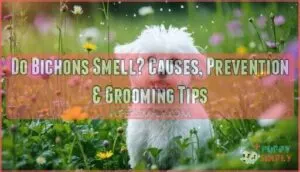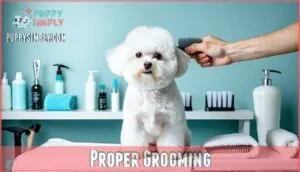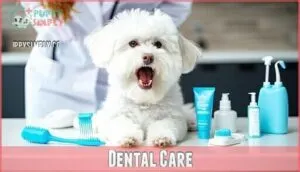This site is supported by our readers. We may earn a commission, at no cost to you, if you purchase through links.

The truth is, that picture-perfect coat comes with hidden challenges—their dense double fur acts like a moisture trap, creating the perfect environment for bacteria and oils to accumulate. Between their velcro-like texture that snags everything from pollen to food particles, plus a tendency toward skin allergies, Bichons need more than the occasional bath to stay fresh.
Understanding why these dogs develop odor and how to prevent it starts with looking beyond the fluff to what’s happening underneath.
Table Of Contents
- Key Takeaways
- Are Bichons Stinky Dogs?
- Why Do Bichons Smell Bad?
- How to Keep Bichons From Smelling
- Other Odor Solutions for Bichons
- What Are Your Tips for Smelling Fresh?
- Frequently Asked Questions (FAQs)
- Does a Bichon Frise dog have a strong smell?
- Why does a Bichon Frise smell bad?
- Why does my Bichon Frise have a ginger smell?
- Is a Bichon Frise considered hypoallergenic?
- Do dachshunds have a strong smell?
- Why can’t I Smell my Dog?
- At what age do bichons start to develop a doggy odor?
- How often should you bathe a bichon frise?
- Can diet changes reduce Bichon body odor?
- How often should Bichon ears be cleaned?
- Conclusion
Key Takeaways
- Bichon Frises aren’t naturally smelly dogs, but their dense double coat traps moisture, oils, and debris close to the skin, creating an ideal environment for bacteria and yeast that produce musty odors if grooming is neglected.
- The primary odor culprits include allergies affecting up to 50% of Bichons (triggering skin infections), dental disease present in 80% of dogs by age two, and their velcro-like fur that magnetically attracts dirt, food particles, and outdoor allergens.
- Effective odor prevention requires daily brushing to prevent matting, monthly baths with hypoallergenic shampoo, professional grooming every 6-8 weeks, and several-times-weekly teeth brushing to combat the breed’s predisposition to dental problems.
- Diet quality directly impacts body odor since food allergies can trigger skin inflammation and digestive issues, making premium food without common allergens essential alongside environmental management like regular bedding washing and air purifiers.
Are Bichons Stinky Dogs?
When most folks picture a Bichon Frise, they imagine a cloud-white puffball that smells like fresh laundry—but is that reputation entirely deserved? The good news: Bichon Frises aren’t naturally stinky dogs. Their breed characteristics actually make them one of the lower-odor options out there.
That said, their fluffy double coat can trap moisture and debris, setting the stage for dog odor if you skip regular Bichon Frise grooming. Skin infections, dental issues, and allergies are the usual culprits behind dog smell problems.
With consistent grooming tips and odor prevention strategies, your Bichon stays fresh and health issues stay at bay.
Why Do Bichons Smell Bad?
Even though Bichons aren’t naturally stinky, certain breed-specific traits can make them more prone to developing odors. From their dense coat to their sensitive skin, several factors work against keeping them fresh.
Let’s look at the main culprits that can turn your fluffy companion into a less-than-pleasant housemate.
Fluffy Double Coat
That luxurious Bichon Frise double coat—soft, fluffy, and absolutely irresistible—can also trap moisture, dirt, and oils close to the skin. Without consistent coat maintenance and proper dog grooming, this dense fur becomes a breeding ground for bacteria, leading to that unmistakable doggy odor. Fur matting compounds the problem by locking in debris and creating pockets where yeast and bacteria thrive.
Regular Bichon Frise grooming, including thorough brushing every few days and professional grooming every four to six weeks, lifts away buildup and keeps shedding issues minimal. Your diligent double coat care makes all the difference in keeping your pup fresh and comfortable. To prevent matting and keep the coat clean, it’s vital to use the right grooming tools regularly.
Housebreaking Difficulties
Bichon Frises can be stubborn during potty training, and indoor accidents leave lingering smells that seep into carpets and furniture. That’s why consistent housebreaking is your first line of defense for dog odor control and prevention.
Here are three proven housebreaking tips to prevent dog smell:
- Establish crate training routines—take your Bichon outside immediately after meals, naps, and playtime to reinforce accident prevention.
- Designate specific potty areas outdoors and use enzymatic cleaners indoors to eliminate odor traces that encourage repeat accidents.
- Reward successful outdoor bathroom trips with treats and praise to strengthen good pet hygiene habits quickly.
Allergies
Up to half of all Bichons develop allergies, and those allergic reactions trigger a cascade of skin problems that create noticeable odor. When your Bichon experiences environmental triggers like pollen or dust mites, or food sensitivities to ingredients like beef or chicken, the constant scratching and licking opens the door to bacterial infections. These skin conditions produce that unmistakable musty smell.
Half of all Bichons develop allergies that trigger skin infections, producing musty odors from constant scratching and bacterial overgrowth
Flea control is equally important—flea saliva causes severe reactions in Bichons, leading to hot spots concentrated at the tail base. Regular allergy management through hypoallergenic shampoos, dietary adjustments, and veterinary oversight helps prevent these canine health issues before odor develops.
Proper grooming techniques, including daily brushing with hypoallergenic tools, can also help reduce allergen production and prevent skin problems.
Velcro-Like Fur
Your Bichon’s cottony coat acts like a magnet for odor-causing debris. The dense fur texture traps everything it touches—mud, food particles, grass clippings, and outdoor allergens—creating a perfect environment for bacteria to thrive. Without consistent coat maintenance, these contaminants embed deep within hair tangles, producing that stale smell even between baths.
Effective Bichon Frise care and maintenance requires:
- Daily brushing with proper grooming tools to remove trapped debris before matting occurs
- Weekly spot-cleaning of paws and face using pet-safe wipes
- Monthly professional grooming to address fur matting and maintain coat health
- Post-walk inspections to catch burrs and dirt immediately
Regular grooming prevents shedding issues from compounding odor problems while keeping your Bichon Frise fresh.
How to Keep Bichons From Smelling
Once you’ve figured out what’s causing the smell, you can tackle it head-on. The good news is that most odor problems are preventable with the right care routine.
Here are two foundational strategies that’ll keep your Bichon smelling fresh.
Proper Grooming
Regular grooming isn’t just about keeping your Bichon looking good—it’s your first line of defense against unwanted odors. Brushing techniques matter: work through your dog’s fluffy coat daily to prevent mats from trapping moisture and bacteria. Focus on areas behind the ears, under the legs, and around the tail where matting sneaks up quickly.
Mat removal can’t wait—those tangled clumps create perfect hideouts for odor-causing gunk. Even though Bichon Frise grooming involves managing a non-shedding breed, shedding control through consistent brushing keeps dead hair from building up.
Schedule professional dog grooming every 6–8 weeks for thorough coat maintenance, nail care, and sanitary trims. Between visits, your dog grooming routine should include wiping skin folds and checking for any funky smells that signal trouble brewing.
Dental Care
Your Bichon’s mouth deserves as much attention as that fluffy coat—dental hygiene plays a starring role in keeping your dog fresh-smelling. Small breeds like Bichons face crowded teeth that trap plaque and tartar, turning bad breath into a daily reality. Up to 80% of dogs show dental disease by age two, and Bichons rank especially high on that list.
Here’s what actually works for oral health:
- Brush teeth several times weekly using dog-specific toothpaste, focusing on the gum line where bacteria accumulate and gum disease takes root
- Offer dental chews regularly to reduce plaque control issues—these treats lower calculus buildup and shift mouth bacteria toward healthier strains
- Schedule professional teeth cleaning annually or as your vet recommends, since proper dog dental care catches periodontal problems before tooth loss occurs
Consistent oral hygiene prevents that musty mouth odor from compounding your Bichon’s overall scent. Dental care isn’t optional—it’s preventive medicine.
Other Odor Solutions for Bichons
Beyond the basics, you might need to dig a little deeper if your Bichon’s still carrying an unwanted scent. Sometimes the solution lies in targeted interventions that address specific underlying issues contributing to dog odor.
Consider these additional dog odor solutions for eliminating dog smell:
- Dietary adjustments: Poor-quality food can trigger digestive upset and foul odors from both ends. Gradually switch to a premium diet formulated for small breeds, and consider an elimination diet if food allergies seem likely.
- Specialized products: Hypoallergenic shampoos, coat conditioners, and odor neutralizers work wonders for sensitive skin. Natural remedies like oatmeal baths soothe irritation without harsh fragrance options that might worsen allergies.
- Environmental management: Air purifiers reduce airborne dander and odor particles, while regular washing of bedding prevents bacterial buildup that contributes to preventing dog odor long-term.
What Are Your Tips for Smelling Fresh?
You’ve tackled the obvious culprits—now let’s talk about what actually works when you’re living with a Bichon day in and day out. Fresh Coat Care starts with consistency in your dog grooming tips routine:
- Brush thoroughly every two to three days to prevent matting and distribute natural oils
- Schedule professional grooming every six to eight weeks for deep cleaning
- Practice Regular Bathing monthly using hypoallergenic, fragrance-free shampoo
- Wipe dirty paws immediately after walks to stop debris from embedding in fur
- Monitor diet closely—an Odor Free Diet means premium food without common allergens
- Try elimination diets if certain ingredients trigger digestive issues or dog smell
- Maintain dental Hygiene Practices with daily brushing or dental chews
- Clean ears weekly to catch infections early
- Express anal glands as needed by your vet
- Wash bedding and toys regularly to remove odor-causing bacteria
- Use air purifiers in your home for preventing dog odor long-term
- Apply Skin Health Tips like oatmeal baths for soothing irritation without harsh chemicals
Finding your rhythm with these dog hygiene strategies makes eliminating dog smell manageable rather than overwhelming.
Frequently Asked Questions (FAQs)
Does a Bichon Frise dog have a strong smell?
Bichon Frises don’t naturally carry a strong smell—they’re actually considered a low-odor breed. However, poor dog grooming and hygiene, skin infections, ear health issues, anal gland problems, or diet quality can trigger Bichon Frisé bad odors, making veterinary care essential.
Why does a Bichon Frise smell bad?
Most bad smells in Bichon Frises stem from skin infections, ear issues, dental disease, or anal gland problems. Dietary factors and inadequate grooming also contribute. Regular health checkups help identify underlying causes before dog odor becomes persistent or severe.
Why does my Bichon Frise have a ginger smell?
A ginger or rust-colored smell in your Bichon Frise usually signals a yeast infection on the skin.
Yeast thrives in warm, moist areas—think paws, skin folds, or under matted fur—producing that distinctive musty, gingery odor that’s hard to miss.
Is a Bichon Frise considered hypoallergenic?
Yes, Bichon Frises are considered hypoallergenic breeds due to their low shedding and dense fur that traps dander. While no dog is completely allergen-free, their breed characteristics and gentle nature make them suitable for many people with mild skin allergies when paired with proper grooming and hypoallergenic shampoo.
Do dachshunds have a strong smell?
Like a fire hydrant calling to them, Dachshunds can develop noticeable dog odor from their low-slung build, which exposes them to dirt and moisture.
Their grooming needs include regular bathing and coat care to manage breed odor and maintain proper Dachshund hygiene, addressing smell causes through consistent odor control.
Why can’t I Smell my Dog?
You’ve likely experienced nasal fatigue—constant exposure to your dog’s scent causes smell acclimation, raising your odor threshold.
This olfactory sensitivity decline is normal; pet odor becomes masked through daily proximity, preventing you from detecting dog odor that visitors notice immediately.
At what age do bichons start to develop a doggy odor?
Most Bichon Frises don’t develop noticeable dog odor until their senior years, usually around six to eight years old, when oil gland activity increases.
Proper coat maintenance and regular health checks help with odor prevention throughout your pet’s life.
How often should you bathe a bichon frise?
Most owners find success bathing their Bichon Frise every three to four weeks.
Regular bathing with a hypoallergenic shampoo removes dirt and oils without stripping the skin’s natural moisture—essential for preventing skin allergies and maintaining coat health in this breed.
Can diet changes reduce Bichon body odor?
Absolutely—dietary adjustments can markedly reduce body odor in Bichon Frisés. Food allergies often trigger skin inflammation and secondary infections that create unpleasant smells.
Improving nutrient balance bolsters digestive health, while thoughtful meal planning and dietary supplements promote canine health and wellness, addressing dog health issues that contribute to odor.
How often should Bichon ears be cleaned?
You’d think something so adorable couldn’t cause drama, but ear infections sneak up fast.
Check your Bichon’s ears weekly for wax buildup or odor, and clean them every two to three weeks using a veterinarian-approved ear cleaning solution to maintain proper Bichon Frise ear care.
Conclusion
That spotless white coat may look like it should smell like fresh cotton, but as you’ve learned, keeping Bichons odor-free requires understanding what’s hiding beneath the fluff. Their dense fur, skin sensitivities, and velcro-like texture create a perfect storm for unwanted smells, but the solution isn’t complicated.
Regular grooming, consistent bathing, and attention to dental health transform the question "do bichons smell" from a complaint into a manageable routine. When you address the root causes rather than masking symptoms, your Bichon can truly live up to that cloud-like appearance—smelling as sweet as they look.
- https://wagwalking.com/behavior/why-do-bichon-frises-smell
- https://iheartdogs.com/top-dogs-that-smell-as-fresh-as-they-look/
- https://www.newsweek.com/dog-breeds-do-not-smell-your-home-akc-bichon-frise-terrier-basenji-1648354
- https://manypets.com/us/breeds/dogs/bichon-frise/
- https://www.petmd.com/dog/breeds/bichon-frise











